The programme is only conducted in Lithuanian language. Entry requirements for this particular programme can be found in the programme description provided in Lithuanian language.
in Lithuanian
This programme develops educational leaders capable of designing curricula that respond to social and economic change. You will explore educational phenomena, analyse educational innovations and develop skills in contemporary educational management. Educology is the science that helps shape a culture of lifelong learning and addresses one of society’s greatest challenges: how to make education accessible, inclusive and meaningful for everyone.

The quality of this programme is demonstrated by more than 30 years of experience and a wide range of leaders and practitioners. You will gain knowledge of education systems, technology, creativity and leadership skills. This environment will inspire you and make you more passionate about education and learning every day.

The infrastructure, adapted to modern didactics, offers space for creativity, innovation and hands-on learning. Some of the lectures take place in inspiring KTU teaching spaces such as EDU_Lab and M-Lab.
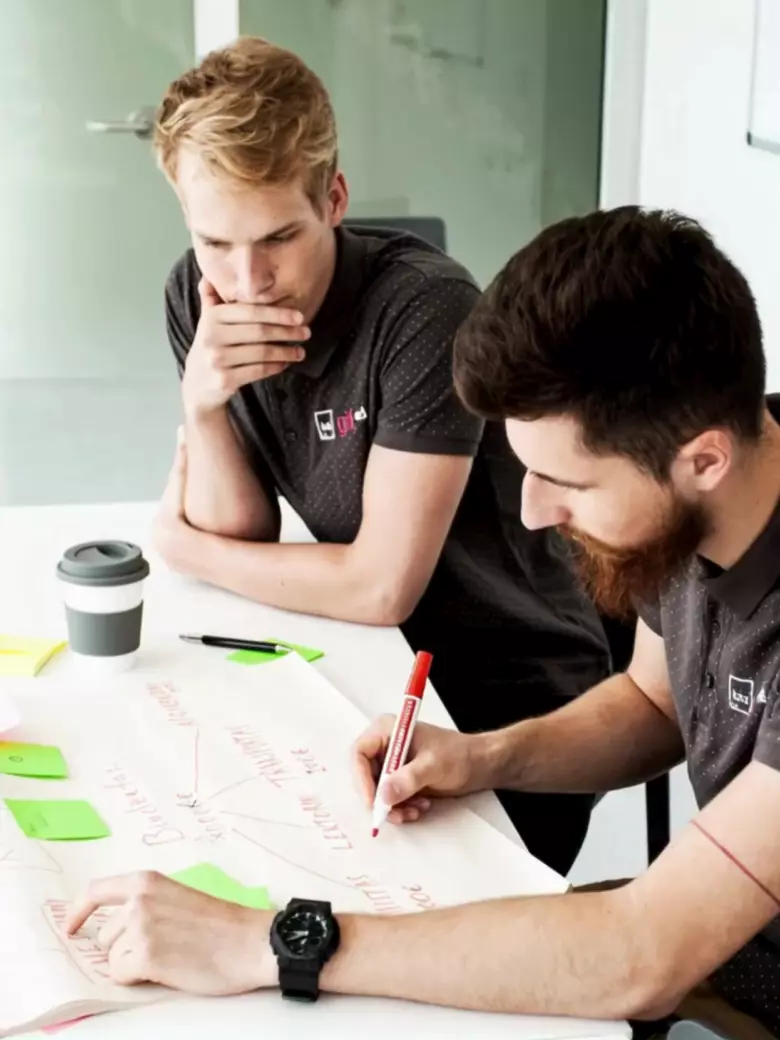
You will learn how to apply theory to practice, use analytical research tools, manage an educational system and develop educational content. Innovative modules with technology integration will provide you with the up-to-date knowledge and skills needed for a successful career.
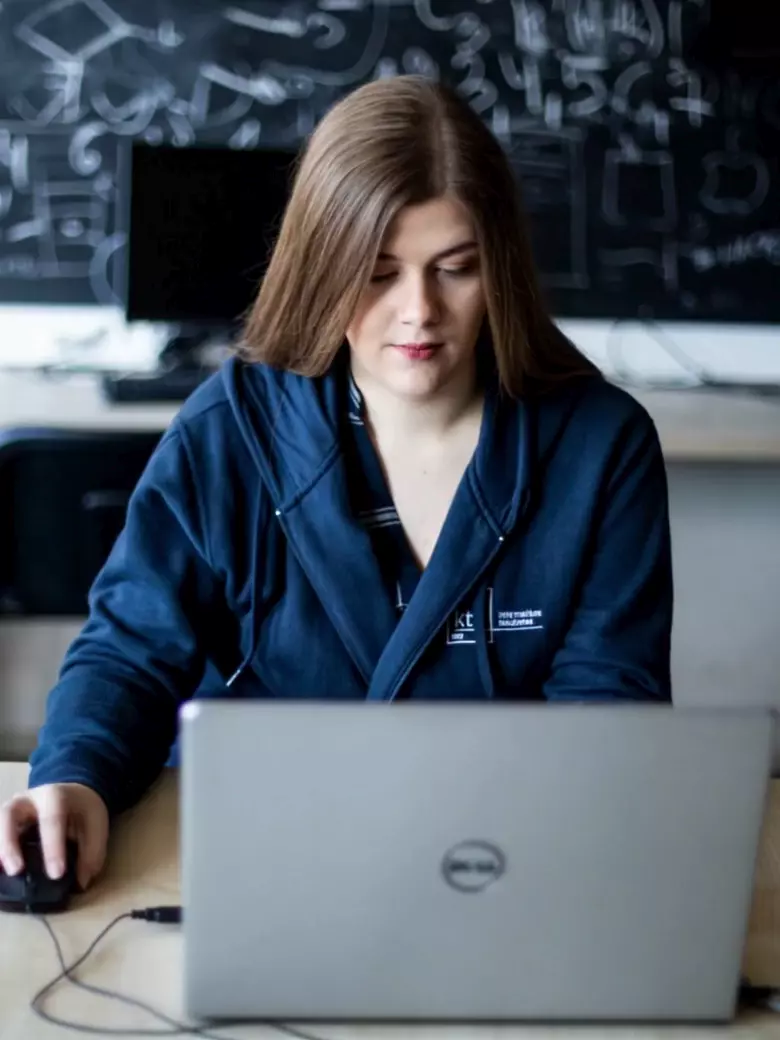
Experience a personalised and dynamic study experience – choose a flexible learning path, broaden your knowledge with a range of competencies and become an interdisciplinary expert.
Make a difference in education – increase knowledge, develop innovative teaching methods and shape the future of education.
A degree in Education will provide you with knowledge of educational theories, methods and process analysis. You will learn how to develop innovative curricula, solve educational problems and contribute to the improvement of the sector. Practical sessions and tutorial support will ensure you are ready for the job market and able to lead change in education.
Here are some of the careers you can pursue after your studies:
Develops, evaluates and improves education strategies and decisions based on sound analytical insights
Responsible for the administration of educational establishments, the development and implementation of strategies, and for ensuring the quality of education.
Supports both educational institutions and business organisations in enhancing learning processes, fostering innovation, and improving learning strategies.
| Module name | Credits | Method of organisation |
|---|
| Andragogy | 6 | Blended learning |
| Discourses of Contemporary Education | 6 | Blended learning |
| Management of Educational System | 6 | Distance learning |
| Social Research Methods | 6 | Blended learning |
| Courses of Study Field (Competence of Expert) | 6 |
| Knowledge Management | 6 | Blended learning |
| Development of Challenge-Based Innovation | 3 | Blended learning |
| Optional Micro-modules | 3 | Distance learning |
| Multimedia Content Creation Methods | 6 | Blended learning |
| Data Mining Methods | 6 | Blended learning |
| Cryptographic Systems | 6 | Blended learning |
| Studies of Modern Languages (Level A1) | 6 | On-campus learning |
| Studies of Modern Languages (Level A2) | 6 | On-campus learning |
| Studies of Modern Languages (Level B1) | 6 | On-campus learning |
| Studies of Modern Languages (Level A1) | 6 | On-campus learning |
| Studies of Modern Languages (Level A2) | 6 | On-campus learning |
| Studies of Modern Languages (Level B1) | 6 | On-campus learning |
| Studies of Modern Languages (Level A1) | 6 | On-campus learning |
| Studies of Modern Languages (Level A2) | 6 | On-campus learning |
| Studies of Modern Languages (Level B1) | 6 | On-campus learning |
| Studies of Modern Languages (Level A1) | 6 | On-campus learning |
| Studies of Modern Languages (Level A2) | 6 | On-campus learning |
| Studies of Modern Languages (Level B1) | 6 | On-campus learning |
| Studies of Modern Languages (Level A1) | 6 | On-campus learning |
| Studies of Modern Languages (Level A2) | 6 | On-campus learning |
| Studies of Modern Languages (Level B1) | 6 | On-campus learning |
| Studies of Modern Languages (Level A1) | 6 | On-campus learning |
| Studies of Modern Languages (Level A2) | 6 | On-campus learning |
| Studies of Modern Languages (Level B1) | 6 | On-campus learning |
| Business Law | 6 | Blended learning |
| Strategic Management | 6 | On-campus learning |
| Project Planning and Organisation | 6 | Blended learning |
| Studies of Modern Languages (Level C1) | 6 | On-campus learning |
| Module name | Credits | Method of organisation |
|---|
| Curriculum Management | 6 | Distance learning |
| Leadership | 6 | Distance learning |
| Management of Educational Innovations | 6 | Blended learning |
| Modern Educational Systems and Technologies | 6 | Blended learning |
| Courses of Study Field (Competence of Expert) | 6 |
| Social Education and Inclusion | 6 | Blended learning |
| Development of Challenge-Based Innovation | 6 | Distance learning |
| Principles of Image Perception | 6 | Blended learning |
| Multivariate Statistical Models | 6 | Blended learning |
| Data Security Technologies | 6 | Blended learning |
| Studies of Modern Languages (Level A2) | 6 | On-campus learning |
| Studies of Modern Languages (Level B1) | 6 | On-campus learning |
| Studies of Modern Languages (Level B2) | 6 | On-campus learning |
| Studies of Modern Languages (Level A2) | 6 | On-campus learning |
| Studies of Modern Languages (Level B1) | 6 | On-campus learning |
| Studies of Modern Languages (Level B2) | 6 | On-campus learning |
| Studies of Modern Languages (Level A2) | 6 | On-campus learning |
| Studies of Modern Languages (Level B1) | 6 | On-campus learning |
| Studies of Modern Languages (Level B2) | 6 | On-campus learning |
| Studies of Modern Languages (Level A2) | 6 | On-campus learning |
| Studies of Modern Languages (Level B1) | 6 | On-campus learning |
| Studies of Modern Languages (Level B2) | 6 | On-campus learning |
| Studies of Modern Languages (Level A2) | 6 | On-campus learning |
| Studies of Modern Languages (Level B1) | 6 | On-campus learning |
| Studies of Modern Languages (Level B2) | 6 | On-campus learning |
| Studies of Modern Languages (Level A2) | 6 | On-campus learning |
| Studies of Modern Languages (Level B1) | 6 | On-campus learning |
| Studies of Modern Languages (Level B2) | 6 | On-campus learning |
| Administrative Law | 6 | Blended learning |
| Management of Persons and their Groups | 6 | On-campus learning |
| Project Social and Economical Evaluation | 6 | Blended learning |
| Academic Writing | 6 | On-campus learning |
| Module name | Credits | Method of organisation |
|---|
| Comparative Education | 6 | Blended learning |
| Educational Psychology | 6 | Blended learning |
| Educational Research Project | 6 | Blended learning |
| Information Resources for Social Sciences: Research Project | 6 | Blended learning |
| Courses of Study Field (Competence of Expert) | 6 |
| Scientific Research and Statistical Methods in Education | 6 | Distance learning |
| Optional Challenges | 6 | Distance learning |
| 3D Visualization Methods | 6 | Blended learning |
| Time Series Analysis | 6 | Blended learning |
| Blockchain Methods | 6 | On-campus learning |
| Studies of Modern Languages (Level B1) | 6 | On-campus learning |
| Studies of Modern Languages (Level B2) | 6 | On-campus learning |
| Studies of Modern Languages (Level C1) | 6 | On-campus learning |
| Studies of Modern Languages (Level B1) | 6 | On-campus learning |
| Studies of Modern Languages (Level B2) | 6 | On-campus learning |
| Studies of Modern Languages (Level C1) | 6 | On-campus learning |
| Studies of Modern Languages (Level B1) | 6 | On-campus learning |
| Studies of Modern Languages (Level B2) | 6 | On-campus learning |
| Studies of Modern Languages (Level C1) | 6 | On-campus learning |
| Studies of Modern Languages (Level B1) | 6 | On-campus learning |
| Studies of Modern Languages (Level B2) | 6 | On-campus learning |
| Studies of Modern Languages (Level C1) | 6 | On-campus learning |
| Studies of Modern Languages (Level B1) | 6 | On-campus learning |
| Studies of Modern Languages (Level B2) | 6 | On-campus learning |
| Studies of Modern Languages (Level C1) | 6 | On-campus learning |
| Studies of Modern Languages (Level B1) | 6 | On-campus learning |
| Studies of Modern Languages (Level B2) | 6 | On-campus learning |
| Studies of Modern Languages (Level C1) | 6 | On-campus learning |
| Labour Law | 6 | On-campus learning |
| Business Process Management | 6 | Blended learning |
| Financial Management Decisions | 6 | Blended learning |
| Marketing Management | 6 | Blended learning |
| Negotiation and Conflict Management | 6 | Blended learning |
| Project Planning and Organisation | 6 | Blended learning |
| Psychology of Leadership and Management | 6 | Blended learning |
| Project Quality and Risk Management | 6 | On-campus learning |
| Public Speaking | 6 | On-campus learning |
| Module name | Credits | Method of organisation |
|---|
| Master’s Degree Final Project | 30 | Blended learning |
The programme is only conducted in Lithuanian language. Entry requirements for this particular programme can be found in the programme description provided in Lithuanian language.
in Lithuanian

Studying educations helps personal and professional growth because education is a dynamic process. These studies have given me the knowledge and skills I need to pursue my dream of creating inspiring, supportive and effective educational environments. I really enjoyed the Design Thinking course, which helped me to learn how to creatively solve educational challenges.
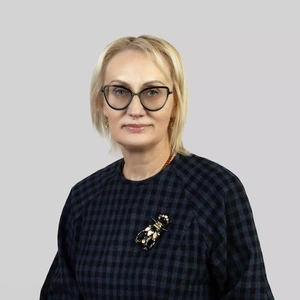
I chose this programme because I wanted to improve my competencies and to explore ways to make the learning process more interesting and motivating for my students. The Master’s degree in Education is very interesting and rewarding. It has changed my career dramatically – I have successfully completed my doctoral studies and am now the Head of the Education Department of Kaunas City Municipality.
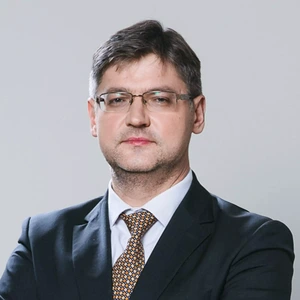
Master’s degree in Education at KTU stand out for its high academic level and practical application. It focuses on data analytics, text analysis and research methodology, with a focus on real-world practical benefits. The demand for highly qualified education professionals is constantly growing, and a Master’s degree opens up a wider range of career opportunities for those wishing to take up management positions in education.
All study materials, exams and academic sessions for this programme are delivered exclusively in Lithuanian.
Yes, education is a promising career, given the increasing global emphasis on quality education and innovative teaching methods. Educationalists can work in educational institutions, governmental and non-governmental organisations, providing advice, developing educational policies and participating in curriculum development.
The Master’s programme in Education covers educational policy, educational management, pedagogy, educational technology, innovation and its application, teaching methodologies, educational systems analysis and principles of educational evaluation and quality assurance. It provides a wide range of theoretical and practical knowledge.
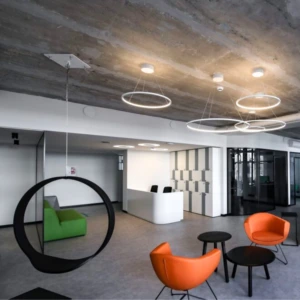
Talk to us, study with us:
K. Donelaičio St. 73, LT-44249 Kaunas
phone +370 679 44 555
email studijos@ktu.lt
Faculty of Social Sciences, Arts and Humanities
I Chamber
A. Mickevičiaus St. 37, LT- 44244 Kaunas
email shmmf@ktu.lt
 virtual tour
virtual tour